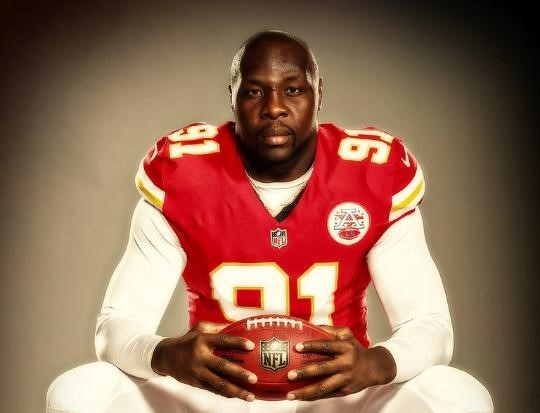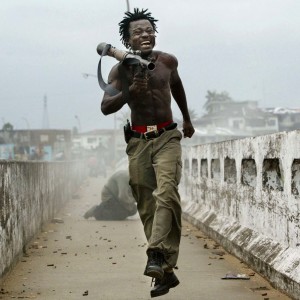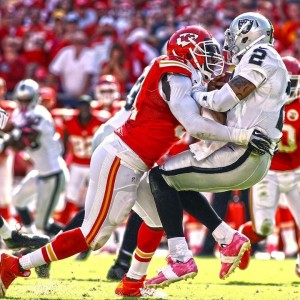
A World in Flames
“Don’t Shoot! Don’t Shoot!” a five-year-old Tamba Hali stood up and yelled at a group of the armed militia as they were shooting at his truck while his family tried to find a safe village to hide.
Scared for her son’s life, Rachel Keita, his mother, rushed to yank him down to safety. It was during Liberia’s first Civil War, a conflict so bloody that it claimed the lives of 600,000 people. In retrospect, Hali knows he should have been scared, but he wasn’t. Something deep inside him had propelled him to try and save the people he cares about the most – his mother and his siblings.
When they found refuge, it was in turmoil. “We were living with people we don’t know. We were living in, kinda like huts, mad houses… we had to go hunt for our food or fish for our food,” he recalled.
It was rough, but they would take that over what was happening elsewhere. Outside their safe zones, it seemed like all humanity was lost, as multiple militias took to the street shooting anyone in sight. “There were civilians that were being killed for no reason… villages were getting run through, so we were hiding from these soldiers or so-called rebels,” Hali remembered.
Given how difficult it was to get by, Hali considered joining the militias. “I thought about becoming a soldier too, I mean trying to get a gun and go to war as well because everybody around you had guns. Guns were everywhere,” he recalled.
Hali’s father, Henry Hali, explained that children joined the army at a very young age, “simply because there is no food.” Hali was the type of child that would take a bullet for his family. Certainly, joining the militia to provide for his family was a tempting idea.
Thankfully, Hali dropped the idea in favor of casting his burden to a higher power. “Our biggest thing was just to serve God. He was the center of our lives and that was all we focused on,” Hali offered.
When the fighting intensified, Keita decided it was best to move to the neighboring Ivory Coast.
“We’d get to the far villages and spend six months there and then come back out and things would cease [the fighting] a little bit. Then, they would start again. After a couple of times of that, [my mother] thought we should flee the country,” Hali remembered.
(Photo Courtesy: Chris Hondros/Getty Images)
Coming to America
“Everything seemed like heaven, like wow, this is America. Because we went from looking for food to where food is always available,” Hali shared.
Before he arrived in the USA, Hali’s father had moved to America to help his children escape the war. “I decided to come to this country because I felt that, by being here, I could better help my kids. If I lived in that country and there is a war, I couldn’t help them,” he shared.
Using his degrees in chemistry and math from Cuttington College in Liberia, Hali’s father found work as a teacher and part-time professor in Teaneck, New Jersey. After achieving his citizenship, he was able to acquire visas for all four of his children to join him. Unfortunately, however, Hali’s mother, Keita was not granted a visa since she was never married to his father.
In 1994, at the age of 10, Hali arrived in the U.S. For his father, things had changed. “He was not the same baby that I left, that I used to hold in the hand… He was not the same kid but, the kid that came was a very respectful kid,” he remembered.
Life in the New World
Hali was excited too, but a new kind of struggle was brewing – the transition. Immediately, he was put in the fifth grade because of his age. “I didn’t even know how to read and write,” he recalled. According to him, this was “the biggest transition” on U.S. soil. The other kids didn’t understand why Hali couldn’t speak, read or write English. They didn’t have the patience to do so.
“It was tough. It was humiliating,” he remembered. “It’s just one of those experiences you have when you’re young, trying to fit in, and people are not accepting you.”
They called him the “African booty scratcher” and sometimes “Kunta,” a reference to the African slave film, “Roots.”
Maybe it was bullying or maybe these kids were just being kids. Either way, “it happens,” said Hali. He had seen worse anyway.
Hali dedicated himself to mastering language. It was there that he discovered his love for rhyme and rhythm. In other words, rap music. He started listening to “The Notorious B.I.G” and “Jay-Z.” Their inspiration sits with him up to this day. Many people don’t know this, but Hali has bars.
The New Safe Haven
Music may have captivated Hali’s imagination, but football claimed all faculties of his mind and body to its service. Hali quickly identified with the game of football. Joe Namath, a former American football quarterback once said that “football is an honest game. It’s true to life. It’s a game about sharing. Football is a team game. So is life.” Considering that Hali and his family had to share and depend on each other for everything to survive, it’s fair to suggest that he identified with the game organically from the core.
Hali made football his new safe haven and gave it everything he had. His motor was fierce and his energy unmatched, as if once again, being propelled by a familiar innate force, not yet fully explored or understood. “He has this inner drive, wherever it comes from. Everybody would love to have what he has inside in him,” said Larry Johnson, his former defensive line coach at Penn State.
For his effort and accomplishments, he was named as an All-American, a hypothetical sports team composed of outstanding amateur players, voted by the media and relevant commentators as the best players in the country.
In 2002, Hali’s football career graduated to the collegiate level when he accepted a scholarship to join the Penn State Nittany Lions under Joe Paterno. Not bad for a guy who didn’t even know what a scholarship was. “I went out and played, and I did well, but I didn’t know what college scholarships were. I didn’t understand that process,” Hali once told ESPN.
However, it wasn’t easy, Hali didn’t have the natural flair for football. Some scouts said he was slower, and shorter than than his peers. But not once did anyone doubt what was inside of him. Rob Rang, a draft expert at NFLDraftScout.com once said, “he’s not such an athlete that he could transition to being a 3-4 linebacker.” But, “he’s hard-working, very intense, very passionate. He’s a guy that every coach wants, but not every scout wants because he’s a little bit undersized.”
Because of his hustle, his career continued to flourish. Among his long list of collegiate accolades, in 2005, he won the Unanimous All-American, First-team All-Big Ten, and Big Ten Defensive Lineman of the Year Awards. In 2006, he won the Senior Bowl Defensive MVP, a collegiate all-star game which showcases the best NFL Draft prospects.
Bigger than Football
Meanwhile, amidst everything, a bigger part of Hali was still missing. “Being away from her for so long, it’s just like, you know, how am I gonna feel when I see her again?” he wondered. “Because she was everything in my life and everything I wanted in my life, and nobody can change that.”
Their communication was irregular and sometimes Hali spent months not hearing from his mother. One day, Hali’s mother escaped what was his most dreaded fear.
“She was walking with… three other friends in the city,” he remembered with sadness. “The three other people that she was walking with got sprayed and they all died. And she (mother) got shot in the knee. By God’s grace, she is still alive. You know, I’m just glad she’s still living. She’s still out there and I’m still praying for her.”
A great man once said that “the thing about football – the important thing about football – is that it is not just about football.” And that was the case for Hali, who at that time, was instinctively driven to use football as a means to a much greater end – the desire to see his mother again.
“When I get on the field, I just you know, use that as a motivational factor for me to be able to play well. And maybe that will open doors for my mom to be able to come to the states,” Hali said.
When the Stars Aligned
(Photo Courtesy: Chiefs.com)
In 2006, Hali was selected 20th overall by the Kansas City Chiefs in the National Football League draft. The gravity of the moment wasn’t lost on him. “I’ll always have many reasons why it has been a blessing… me playing in the NFL, it doesn’t happen to a lot of people,” he said. “You can break it down to a tee from my high school, or even from my college – only two or three guys might leave that team and do well in the pros, maybe.” God has been a blessing in my life. My faith in Jesus Christ has really brought me this far.”
A while later, he got a call he had been waiting for. “They called me up, I went inside, took the test and passed it,” he said. “I waited a couple of more hours and got sworn in and signed my certificate.”
Though he hated being away from practice, he admitted that it “feels good.” He added: “U.S. citizen. Equal rights. I can vote.”
Then, finally, after 12 years, Hali succeeded in bringing his mother to the U.S. He said: “It’s my mom, you know. My mom was in my life from day one. So having her here after being away from her for 12 years … it was a situation almost like your parent was dead for 12 years and now she’s back in your life.
Now that his mother was home, he was a different man. “You can see the difference in me – to have mom and a dad. It just keeps me grounded to have them proud of what I’m doing, and being generally home and nearby emotionally.”
In an article for NBC Sports on November 15, 2013, Joe Posnanski told the story of Hali’s first football game with his mom watching.
“She watched a San Francisco quarterback named Alex Smith drop back to throw. And then she watched as a young man bashed into San Francisco’s 310-pound offensive lineman Kwame Harris, knocked him off balance, ran around him and crunched Alex Smith just as he was trying to throw. The ball popped free. Arrowhead Stadium broke out into a wall of sound.
“That was Tamba Hali’s first sack as a professional football player. Rachel Keita watched her son, and there were tears in her eyes. She had not seen Tamba in 12 years.
“He’s so good,” she shouted after he made that play. “I never could have known he was so good.”
Ten years later, Hali has risen to become one of the greatest players in history. He is a five-time Pro Bowler (NFL All-star team) and at his position, he is widely considered as a top-50 all-time pass-rusher.
The Road Back Home
In 2014, Hali learned from the news about what was going on in Liberia during the Ebola outbreak. In a cover story of Sports Illustrated’s the MMQB with Peter King, Hali said: “It kinda dawned on me, this is where I’m from and I should help. I should do something about it.”
King wrote that: “Hali is typically reserved, and he’s not comfortable being a spokesman for anything. This is different, though. He understands that there are few famous Liberians in America, so he knows it’s up to him to speak up and try to get people to donate money and time to help contain Ebola, a viral disease for which there is no proven treatment.”
“We can’t really wait on this,” Hali said. “I’d be the first one to tell you that every time I do charity work, I like to do it on the hush-hush and help people quietly. But there are some matters—like this—that are way bigger than me. All I can do is lend my help in ways I know I can.
“This is not a type of disease you can contract and then there are vaccines and it goes away. People are dying within weeks and within the first month of contact. So we have to act now.”
There it goes again. That exceptionally powerful natural instinct to help and protect those he cares about. Wise men say, “A good man draws a circle around himself and cares for those within – his wife and children. Other men draw a larger circle and bring within their brothers and sisters. But some men have a great destiny. They must draw around themselves a circle that includes many, many more.” It appears that Hali has arrived at the latter.
Hali had always considered going back home for a visit. He was just waiting for the right time. A second civil war and a deadly Ebola outbreak later, Hali decided, it’s time. Early in 2016, he returned to the land of liberty. And it was oh, so wonderful.
Featured Photo: Courtesy of Chiefs.com








